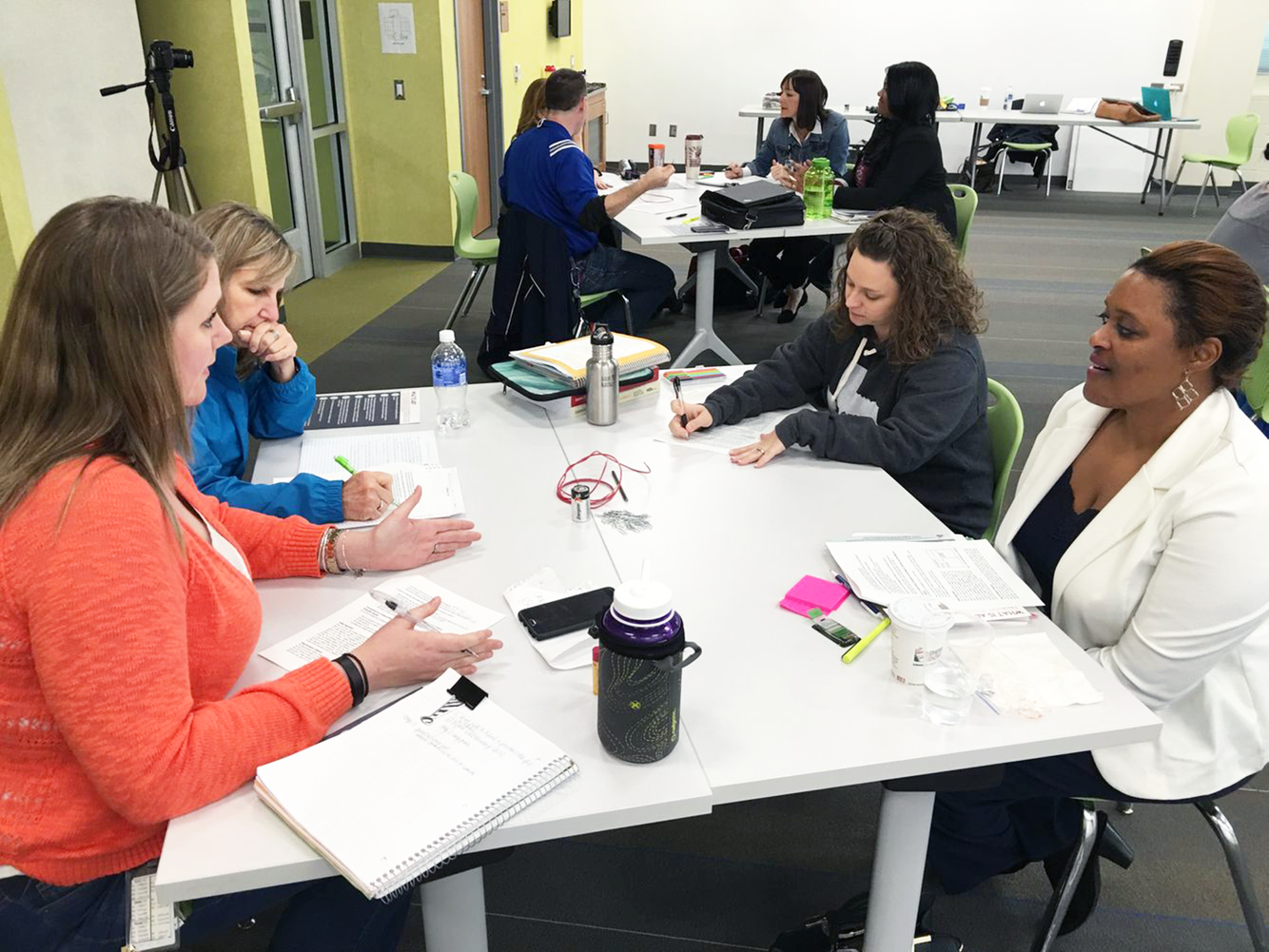
Research on Argument-Driven Inquiry
The instructional materials that we create for our programs are designed using the ADI instructional model. This way of teaching was developed to help make science and math education meaningful, rigorous, and equitable. The ADI instructional model was tested and refined through research that was carried out by educational researchers, scientists, and mathematicians at Florida State University and The University of Texas at Austin in collaboration with middle and high school teachers. Other educational researchers are now examining how the use of the ADI instructional model affects student learning in a wide range of other contexts. The major findings of this research have been published in numerous peer-reviewed educational research journals.
Findings from Peer-Reviewed Research
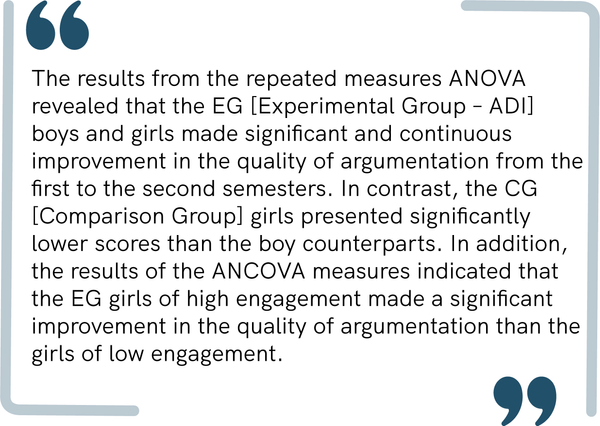
Chen, H. T., Wang, H. H., Lu, Y. Y., & Hong, Z. R. (2019). Bridging the gender gap of children’s engagement in learning science and argumentation through a modified argument-driven inquiry. International Journal of Science and Mathematics Education, 17(4), 635-655.
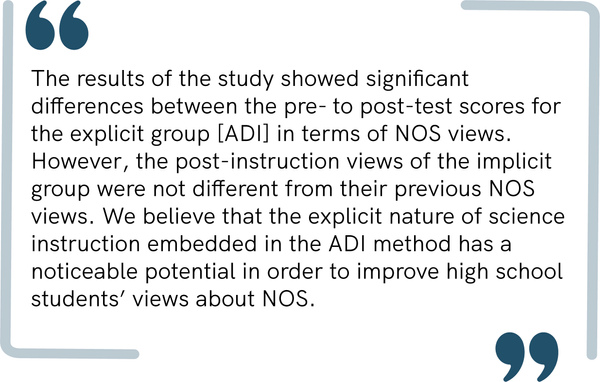
Eymur, G. (2019). The influence of the explicit nature of science instruction embedded in the Argument-Driven Inquiry method in chemistry laboratories on high school students’ conceptions about the nature of science. Chemistry Education Research and Practice, 20(1), 17-29.

Salsabila, E. R., Wijaya, A. F. C., Winarno, N., & Hanif, S. (2019). Using argument-driven inquiry to promote students’ concept mastery in learning global warming. Journal of Physics: Conference Series, 1280(3), 032052.
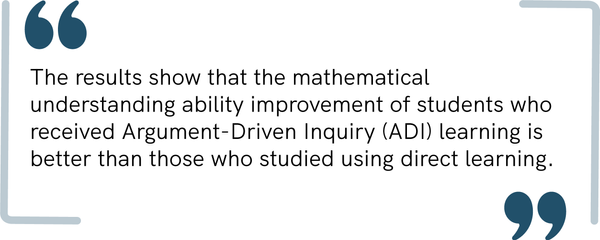
Hidayat, W., & Aripin, U. (2019). The improvement of students’ mathematical understanding ability influenced from argument-driven inquiry learning. Journal of Physics: Conference Series, 1157(3), 32085.
"Students experiencing ADI instruction scored higher on the Chemistry Concept test and the Argumentative Writing Assessment than students experiencing SI instruction. Furthermore, girls who experienced ADI instruction scored higher on the assessments than their majority peers in the same class."
Cetin, P., Eymur, G., Southerland, S., Walker; J., & Whittington, K. (2018) Exploring the effectiveness of engagement in a broad range of disciplinary practices on learning of Turkish high-school chemistry students. International Journal of Science Education, 40(5) 473-497
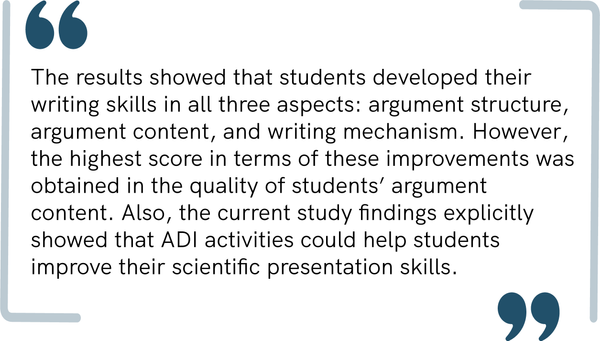
Çetin, P. S. & Eymur, G. (2017). Developing students’ scientific writing and presentation skills through argument driven inquiry: an exploratory study. Journal of Chemical Education, 94(7), 837-843.
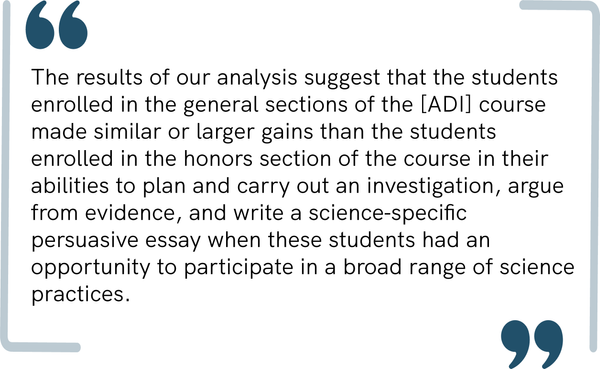
Strimaitis, A. M., Southerland, S. A., Sampson, V., Enderle, P., & Grooms, J. (2017). Promoting Equitable Biology Lab Instruction by Engaging All Students in a Broad Range of Science Practices: An Exploratory Study. School Science and Mathematics, 117: 92-103.
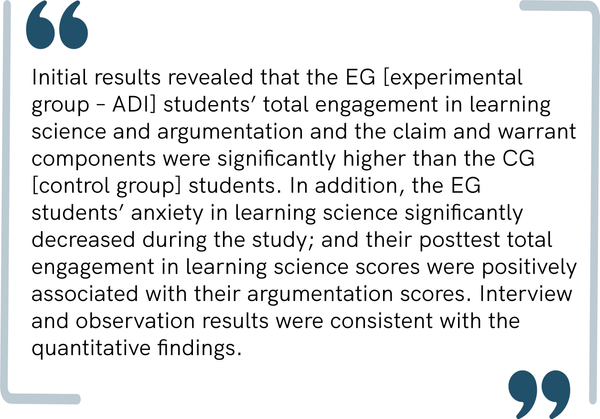
Chen, H. T., Wang, H. H., Lu, Y. Y., Lin, H. S., & Hong, Z. R. (2016). Using a modified argument-driven inquiry to promote elementary school students’ engagement in learning science and argumentation. International Journal of Science Education, 38(2), 170-191.
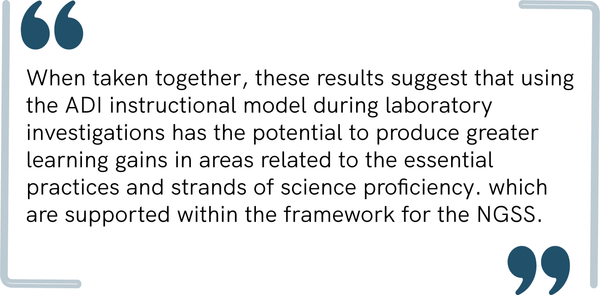
Grooms, J., Enderle, P, & Sampson, V. (2015). Coordinating Scientific Argumentation and the Next Generation Science Standards through Argument-Driven Inquiry. Science Educator, 24(1), 45-50.
"Students who were taught with either ADI (N = 81) or Traditional (N = 76) had equivalent understanding of content based on the ACS-GCST exam, however the mean score on the practical exam was significantly higher for students in the ADI sections. Results also indicate that the mean scores on the practical exam were significantly higher in the ADI sections for all students including female students, under-represented minority (URM) students, and students with lower past academic achievement."
Walker, J., Sampson, V., Southerland, S., & Enderle, P. (2016). Using laboratory to engage students in science practices. Chemistry Education Research and Practice, 17, 1098-1113.
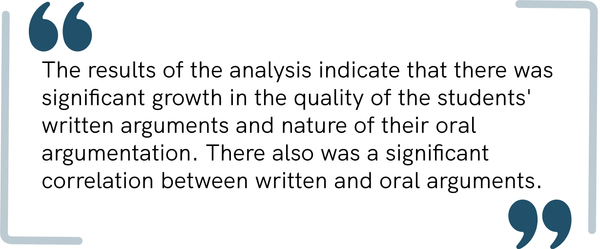
Walker, J. and Sampson, V. (2013). Learning to argue and arguing to learn in science: Argument-Driven Inquiry as a way to help undergraduate chemistry students learn how to construct arguments and engage in argumentation during a laboratory course. Journal of Research in Science Teaching, 50(50), 561-596
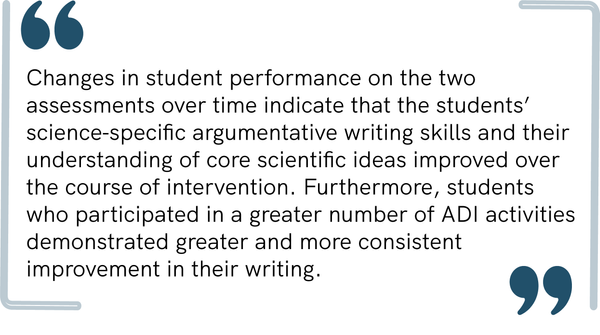
Sampson, V., Enderle, P., Grooms, J., & Witte, S. (2013). Writing to learn and learning to write during the school science laboratory: Helping middle and high school students develop argumentative writing skills as they learn core ideas. Science Education, 97(5), 643-670.
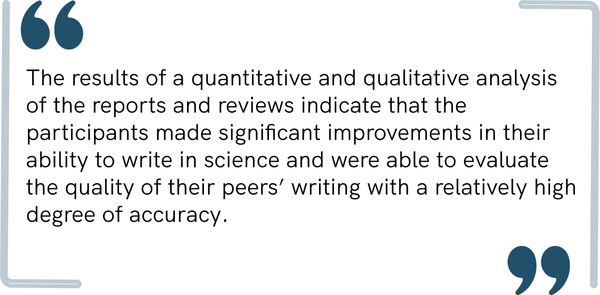
Sampson, V. and Walker, J. (2012). Argument-Driven Inquiry as a way to help undergraduate students write to learn by learning to write in chemistry. International Journal of Science Education, 34(10), 1443-1485.
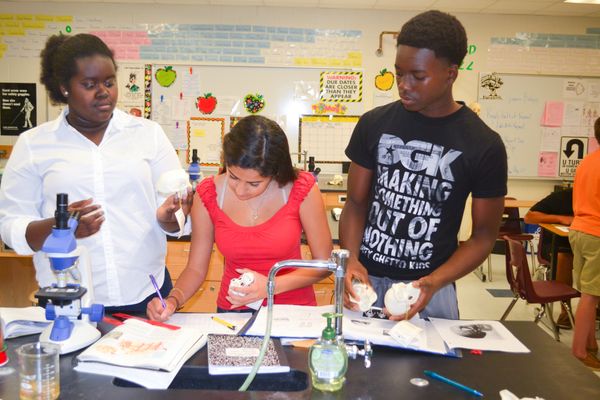
What do we mean by rigorous?
Meaningful and rigorous work presses learners to go beyond what they currently know and can do. A meaningful and rigorous learning experience gives students an opportunity to figure out how or why something happens or to develop a solution to an authentic problem by engaging them in the intellectual activities and practices of one or more STEM disciplines. For us, rigor does not mean covering more content or decreasing the amount of time that is spent on a topic. Rigor is about learning from mistakes, thinking in new ways, and encouraging the use of ideas and practices from the STEM Disciplines to make sense of the world around us.
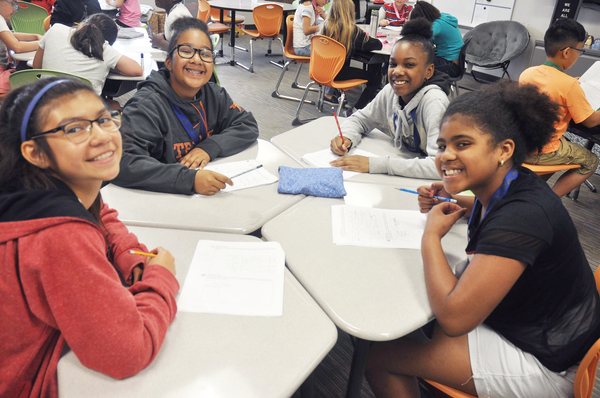
What do we mean by equitable?
Equity means providing all students, rather than a select few, with a fair opportunity to learn the ideas and practices of the STEM disciplines. It also means doing everything possible to ensure that every student inside a classroom feels like their ideas and participation are valued because they have unique life experiences and ways of talking or thinking that are useful. Equitable instruction teaches all students to see themselves, other students, and the teacher as knowers and doers of science, mathematics, or engineering and an important component of a supportive learning community.
